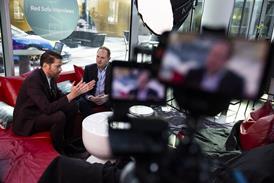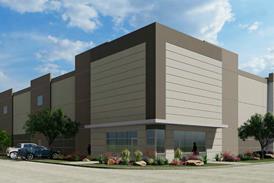All Russian Federation articles – Page 3
-
 News
NewsUkraine’s vital link in the European supply chain
The closure of Ukraine’s supplier industry and the impact on logistics routes reveals how important the country is to European automotive production
-
 Feature
FeatureRussia’s invasion of Ukraine is a long-term risk for the automotive supply chain
The impacts stretch beyond inflation and corporate retreats to critical shortages upstream for semiconductor and EV supply.
-
 News
NewsBlog: Conflict in Ukraine disrupts auto supply in Europe and Russia
Read rolling updates on the developing situation in Ukraine, wider Europe and Russia as it impacts the global automotive supply chain
-
 News
NewsGermany localises LNG supply as prices rise
The cutting of LNG supplies from Russia has hit supplies to Europe and prompted the fast-tracking of a number of new projects to localise supply, most notably in Germany
-
 News
NewsUkraine invasion causes widespread supply chain disruption
The Russian invasion of Ukraine has shut down production across the country and led to widespread supply chain disruption in Europe, while sanctions threaten production in Russia
-
 News
NewsUkraine border tension threatens automotive supply chain
The threat of conflict between Russia and Ukraine is destablising the automotive supply chain in Eastern Europe and carmakers and tier suppliers are looking at alternative sources of imported parts
-
 News
NewsBo Andersson takes up new role with Uzbek carmaker Avtosanoat
The company said the appointment of Andersson will help it navigate the supply chain disruption currently affecting the automotive industry and help modernise production for the future
-
 News
NewsGefco working with Fenix for Volvo deliveries through Bronka port
Gefco is working with Russian port operator Fenix to manage the import of Volvo Cars volumes through the port of Bronka near St Petersburg and onward distribution to the Russian market
-
 News
NewsAvtoVaz opens largest regional Lada aftermarket PDC in Tver
AvtoVaz has opened a 25,000 sq.m aftermarket parts distribution centre (PDC) for the Lada brand in Tver, which will help with same-day and next-day service parts deliveries to dealerships in the central federal region
-
 News
NewsReturning vehicle sales test Russian ro-ro capacity
Returning vehicle sales in Russia are prompting ocean transport providers to return laid up vessels into operation as capacity on international routes becomes tighter. Higher tariffs on containerised vehicle shipments from China is also leading to a switch in mode to ocean, adding to the demand for more services. That is expected to create an imbalance in supply and demand in the ro-ro transport sector in the short and medium-term.
-
 News
NewsNicolas Maure to take CEO role at Renault Russia
Nicolas Maure will take over as CEO of Groupe Renault operations in Russia and the Commonwealth of Independent States (CIS) from the beginning of May this year. The role is newly created as Renault moves from appointing chairmen of different regions to assigning CEOs of brands within them. Maure will report to Groupe Renault CEO, Luca de Meo.
-
 News
NewsDaimler Kamaz Rus hits truck production milestone
Daimler’s joint venture with Russian truck maker Kamaz celebrated the production of its 25,000th Mercedes-Benz truck at the Daimler Kamaz Rus (DK Rus) plant in Naberezhnye Chelny last week – a white Mercedes-Benz Actros 1845 LS.
-
 News
NewsElectric vehicles supporting sales through pandemic, says head of Gefco Russia
Gefco Russia’s general director says that electric vehicles have been the one bright spot in terms of global vehicle and parts shipments in a industry otherwise still suffering from the impact of the coronavirus pandemic
-
 News
NewsChinese carmaker Haval signs a major investment contract in Russia
Chinese carmaker Haval has signed a special investment contract worth 42.4 billion rubles ($650m) to expand the car plant it opened in Uzlovaya last year and build a components plant to localise the supply of core parts, including engines, transmissions, electronic control modules, and vehicle control systems
-
 News
NewsDP World to take majority stake in Unico Logistics
Container terminal giant DP World is buying a majority 60% stake in South Korean multimodal transport provider Unico Logistics in a move designed to expand its logistics service offering, including in the automotive sector…
-
 News
NewsGefco now handling vehicle deliveries in France for Ford
Ford has chosen logistics provider Gefco to distribute new vehicles to the carmaker’s dealers in France, equal to 40,000 units annually…
-
 News
NewsRussian car industry needs greater parts localisation to survive
The volume of automotive components being imported into Russian assembly plants has nearly doubled over the past few years but the continued threat of secondary sanctions on the companies supplying them, combined with the impact of Covid-19 on the supply chain, means the Russian automotive industry could shutdown. What it needs for the future is a new localisation strategy, according to Vadim Sorokin, president of Russian vehicle maker Gaz Group.
-
 News
NewsWWO diversifies to mitigate impact of Covid-19 on Russian vehicle imports
The Covid-19 pandemic has hit demand for maritime car carrying services to Russia from Europe by as much as 40%, according to Dmitry Vostrikov, general director of the Russian branch of Wallenius Wilhelmsen Ocean’s (WWO)…
-
 News
NewsCFR Rinkens launches first China-Germany blocktrain for Dongfeng
Freight forwarder CFR Rinkens has made its first westbound rail shipment of containerised vehicles between China and Germany..
-
 News
NewsRussia spending billions to bolster car market
The Russian government has said it will spend Rub20 billion ($240m) to support vehicle purchases across the country this year. The bailout package is focused on providing soft loans by state-owned banks for Russian citizens willing to purchase new vehicles by the end of 2020.

























![Global[1]](https://d3n5uof8vony13.cloudfront.net/Pictures/web/a/d/s/global1_726550.svgz)




